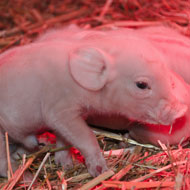
Tremors in newborns down to viral infection - study
Shaking and tremors in newborn piglets are down to a specific viral infection that could be sexually transmitted, scientists have confirmed for the first time.
‘Shaking piglet’ cases have been reported in Europe and elsewhere since the 1920s, but until now, the cause was unconfirmed.
Scientists at Vetmeduni Vienna were able to detect an atypical porcine pestivirus (APPV) in Austrian piglets with congenital tremors, using a newly developed test. They say it is the first time this correlation has been proved, representing an important breakthrough. The findings were published in the journal Veterinary Research.
The test confirmed high numbers of the virus in diseased piglets, and also in the saliva and semen of adult pigs. Co first author Christiane Riedel from the Institute of Virology, commented: “The presence of the virus in the semen of a mature boar sheds new light on how the pathogen may be spread.
“The virus appears to persist in some animals even without symptoms. We detected the pathogen in the semen of a former shaking piglet, which shows that the disease may be transmitted sexually.”
It is thought likely that the virus is transmitted to piglets at a stage of gestation when the central nervous system is developing.
Congenital tremors cause mortality of up to 30 per cent in affected piglets. Depending on the severity, they can prevent newborns from suckling milk properly, which is particularly significant in the first 24 hours after birth.
Lead author Lukas Schwarz, veterinary clinician at the University Clinic for Swine, explained: “Without the first drink of mother’s milk, piglets have a very low chance of survival.”
For piglets who survive this first phase, symptoms generally recede after three or four weeks. Rarely, a slight tremor may remain in the ears. But it requires huge amounts of care and attention from vets and farmers to get piglets this far.
Image © Michael Bernkopf/Vetmeduni Vienna



 The BSAVA has opened submissions for the BSAVA Clinical Research Abstracts 2026.
The BSAVA has opened submissions for the BSAVA Clinical Research Abstracts 2026.